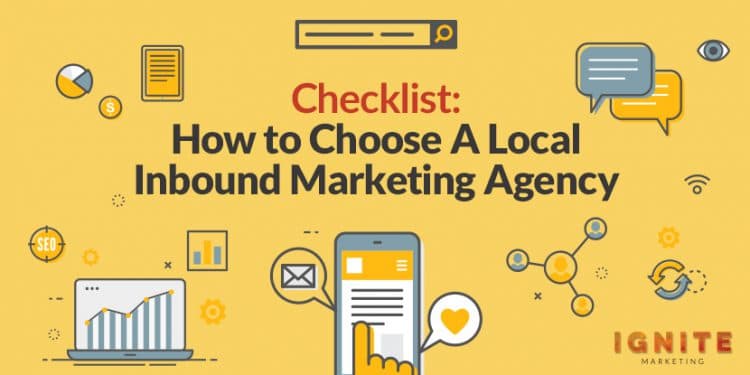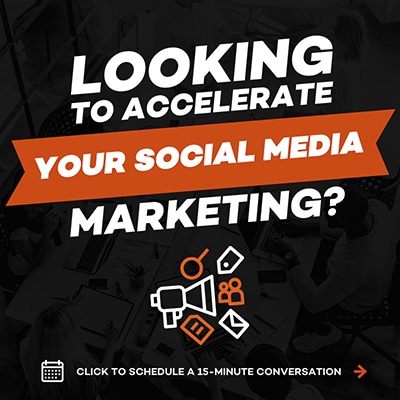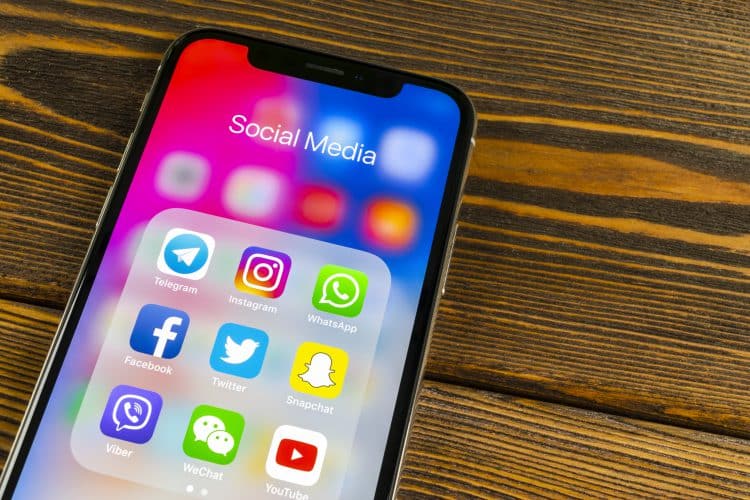


Choosing a local inbound marketing agency is one of the most important business decisions you’ll make. Hiring the right team can make customers seemingly appear out of thin air.
You probably know this already. If you’re like many of the business owners I’ve worked with, the thing you’re getting caught up on is how to choose the right local inbound marketing agency.
They all seem to advertise the same services... how do you know which agencies will deliver on their promises?
To simplify this somewhat confusing process, I’ve created a checklist of things to look for when choosing a local inbound marketing agency:
If you take the time to vet agencies with these criteria before hiring one, I guarantee you’ll find a competent team to help you grow your business.
Marketing agencies are a dime a dozen these days.
Anyone with a computer and a decent vocabulary can set up a website, call themselves a marketing expert, and try to attract clients.
But try as these amateurs might, there’s simply no replacement for a veteran agency who has a proven track record of bringing in new clients (and therefore more revenue).

And it’s important they know what they’re doing, as there’s a ton of stuff involved in digital marketing:
 Because there are so many fake professionals out there, it's imperative you make sure that any local inbound marketing agency you hire has proven they can consistently attract leads and generate a positive ROI.
Because there are so many fake professionals out there, it's imperative you make sure that any local inbound marketing agency you hire has proven they can consistently attract leads and generate a positive ROI.
So, how do you get proof that a marketing agency is effective?
The easiest way is to ask for case studies.
If an agency is competent, they will have at least a few solid case studies showcasing exactly what they’ve been able to do for the businesses they’ve worked with in the past. You should see clear evidence ‒ usually in the form of direct quotes from businesses that have worked with the agency.
Ideally, the case studies will involve businesses in your industry.
While general marketing concepts can be applied to every industry with relative success, each industry has its quirks. Only marketing veterans with previous experience in that industry will know those nuances and can use that knowledge to increase the ROI of your marketing budget.
If you don’t want to waste time sifting through dozens of marketing agency websites, another solid strategy is to ask successful local businesses for a referral to their local inbound marketing agency. By doing this, you’ll get to skip the initial vetting process and start your search with a list of agencies you can trust.
There is a potential issue with asking local businesses for referrals though.
The ideal inbound marketing agency will be one that works exclusively in your industry. The competitors in your area won’t want to share their agencies, especially if those agencies have generated a positive ROI. And those agencies might not want to work with you to avoid a conflict of interest.
A third strategy is to join industry groups on LinkedIn and ask for recommendations from the members. Some of the agencies recommended won’t be local to you, but that’s okay. Many agency-business relationships are formed and maintained entirely over the internet. This can actually be preferable in some circumstances ‒ traveling to a physical meeting to discuss something that could be talked about via email or phone is a waste of time.
Marketing agencies should be good at marketing ‒ this includes marketing their own services.
One key component of an effective marketing strategy is a strong and consistent social media presence. Any marketing agency you hire should be active on at least one social media platform.

If you’re not sure what being “active” on a social media platform looks like, here are a few things to look for:
An effective social media marketing strategy involves sharing different kinds of content. This includes blog content, industry news, helpful infographics, funny images/videos, and more. If the marketing agency you’re considering only shares one or two types of content, tread carefully.
That being said, some types of content are simply more effective on certain platforms and in certain industries. If an agency is sharing one kind of content, they might be doing it intentionally.
For example, if the agency primarily shares funny images or helpful infographics on Instagram, this isn’t necessarily a sign of incompetence. Instagram is a platform optimized for sharing images ‒ a smart marketing agency will recognize and take advantage of that.
Just make sure they do share a variety of content across their social media platforms. If an agency is only posting images on Instagram ‒ and not posting anything on other platforms ‒ that’s a potential sign they don’t know how to effectively leverage those platforms.
A good agency should also be posting on a consistent basis. Go through their post history ‒ there shouldn’t be any significant gaps of time where they didn’t post anything. If there is, it’s a sign that the agency is either inconsistent or relies heavily on a single person to manage key aspects of their business. Neither of these will make for a positive experience.
Any marketing agency you hire should have an aesthetic, responsive website.
It’s not about having a pretty website for the sake of it ‒ these web design statistics should give you a sense of how important good web design is.
I think you get the point ‒ web design is an incredibly important part of your online marketing strategy. Any marketing agency worth your time and money should have a modern website that incorporates web design best practices.
So, how can you tell if a marketing agency's website is up to snuff?
Well, it's pretty easy if you know what to look for. Here are a few aspects of web design you should pay particular attention to:
According to CIODive, up to 70% of website traffic comes from mobile phones. If you have a website, it needs to be optimized for mobile users.
If a marketing agency’s website doesn’t play nicely with smaller phone screens, run away as fast as you can. There is no clearer sign that an agency doesn’t know what they’re doing.
User experience (UX) has become an essential part of the online marketer’s toolkit over the last few years. And with these astounding UX statistics, it's not hard to see why.

UX has become so important that every major company on the planet has hired UX experts to focus solely on optimizing their websites.
You don't need to be an expert to tell if a marketing agency's website was designed with UX in mind though. Just go to each agency's website and ask yourself the following questions:
The speed of an agency's website is also something you should take into account. Here are some site speed stats that show just how important this is:
Fortunately, measuring site speed isn't a judgment call like UX is. There are a bunch of online tools that will measure a site's speed for you. All of these tools use different metrics to determine speed, so they're going to come up with different scores.
Fortunately, there's the only one you need to worry about ‒ the Google PageSpeed Insights test.
You only need to care about Google's test because it'll tell you how fast Google thinks your site is. The score Google gives you will impact your rankings in the organic search results, so you should optimize your site around their recommendations.
You also need to consider how well your marketing agency manages its own website's SEO. If their own SEO isn’t that great, they probably won’t be able to help you with your SEO ‒ which would be an enormous problem, as organic Google traffic is one of the best customer sources out there.
To make sure the agency you’re considering is practicing good SEO, here’s a checklist of things to look for:
While having an SSL certificate doesn’t have an enormous impact on search rank, it’s probably the simplest SEO upgrade a website can implement.
Installing SSL on your website is a free one-time process that only takes a couple of minutes. If a marketing agency’s website doesn’t have the “Secured” symbol on the left side of your browser’s URL bar, I recommend looking for another option.
Filling up your site with well-written blog content is one of the best ways to boost your SEO. The higher traffic numbers, longer sessions, and an increased number of backlinks that blog content provides are all metrics that Google will take into account when determining your site’s authority.

A good website’s URLs will be appealing to both users and the search engine crawlers. An article about improving SEO should have a URL like this: https://website.com/improving-seo. If an agency’s website has URLs that don’t contain an easy-to-read keyword ‒ like https://website.com/article312 or https://website.com/42372395 ‒ don’t use them.
Hubspot is widely considered to be the granddaddy of inbound marketing. While they may not have invented this industry, they are certainly at the forefront of the inbound marketing world.
To help businesses find truly effective marketers, Hubspot has a partnership program where they work with and train agencies to use the absolute best practices inbound marketing has to offer. Any local inbound marketing agency that is certified by Hubspot should be a good bet.
Email marketing might be the most effective inbound marketing strategy out there. According to EmailMonday.com, it generates $38 for every $1 spent. While this number will vary by industry, there’s no doubt sending emails is one of the best ROI-generating strategies out there.
If a local inbound marketing agency is remotely competent, they will know this ‒ and they will be using email marketing to promote their own services.
Ensuring that an agency does send emails to subscribers is a good start, but it’s not enough. You also need to check that their email marketing strategies are effective.

To help you gauge how effective an agency’s email marketing efforts are, you can use this checklist:
As sending emails is one of the best ways to nurture leads and get conversions, making it easy to subscribe to your newsletter is super important. A good marketer will make signing up for their email newsletter effortless. The email signup box should be prominently displayed on their website ‒ it also shouldn’t ask for a bunch of information.
For an email to be effective, it needs to be written well. Subject lines, body text, CTAs ‒ these all need to be worded correctly for an email to properly nurture your leads.
Automating your email campaigns makes sending and timing emails a breeze. Any competent marketer will be automating their campaigns, so be sure to ask them if they do this.
According to Hubspot, 46% of all email opens are on mobile phones. Because smartphones have small screens and mobile users are usually on the go, subject lines and body copy need to be clear and concise. Any confusion or fluff, and your lead is gone.
Using the subscriber’s name in your email subject line and body copy can boost open rates and conversion rates. When you sign up for a marketing agency’s email list, check if they personalize their emails to you. It’s not essential that they do, but seeing that will make you feel more comfortable with hiring them.
Choosing the right local inbound marketing agency is critical. When deciding on an agency, ask the following questions to determine if a team is worth hiring:
